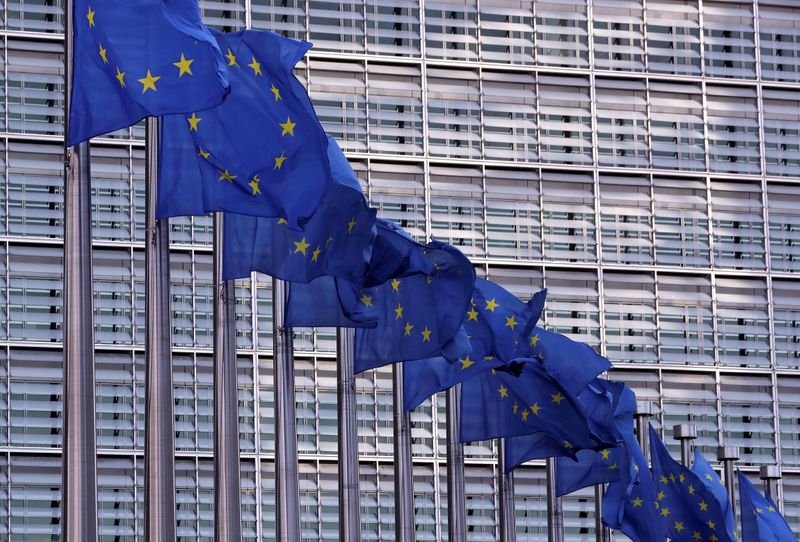By Dhara Ranasinghe and Sujata Rao
LONDON (Reuters) - Step-by-step, the coronavirus crisis is forcing the euro zone into greater integration. But like the euro zone debt crisis before, it may not deliver what bond markets really crave.
A long called for joint euro bond is back on the agenda, but German and Dutch resistance to calls for a 'coronabond' from many southern European states and the European Central Bank is again testing the single currency bloc's cohesion.
For countries like Italy, such a move would underline the commitment of bloc members to each other in times of need. But for Germany, it's the thin end of a wedge which eventually leads to the thrifty north directly subsidising the south.
However, the scale of the coronavirus crisis and the plight of Spain and Italy has already softened Berlin's position on Europe-wide budget rules and strict conditionality in European Stability Mechanism bailouts, big shifts from its hard line during the 2011 Greek debt crisis.
Coronabond supporters argue they would be strictly a one-off. For markets and the ECB, such bonds would offer a benchmark "risk free" euro zone rate to be built on if necessary.
"If there is a time for joint bonds it's now," Luca Paolini, chief strategist at Pictet Asset Management, said.
During any future crisis, such a backstop would shield poorer states from crippling rises in borrowing costs. And long-term, it could boost the euro's reserve currency status.
"Politically, it's very important when there is an emergency that costs are shared equally across the euro area (but) Italy is paying 2% more than Germany," Paolini said, referring to 10-year sovereign borrowing costs.
A joint bond could be issued at a yield of around 0%, he noted, while Italy pays 1.5% for 10-year cash. On a one billion-euro issue, the annual difference amounts to 15 million euros.
While a plain-vanilla pooled bond so far looks unlikely, compromises such as issuing coronabonds through a specially created European rescue fund, are on the table.
The troubles facing the bloc bring to mind predictions by European Union founding father Jean Monnet that piecemeal integration would generate crises, each of which would bring the bloc closer, in a kind of chain reaction.
Germany and the Netherlands opposed ECB bond buying for years, citing a no-bailout rule and fears of underwriting national debts. It took an existential debt crisis, brutal recession and precedents set by other major central banks to soften their opposition in 2015.
"(European policymakers) have a history of only moving towards agreement on monetary or fiscal matters when a crisis necessitates it," Mike Riddell, head of UK fixed income at Allianz (DE:ALVG) Global Investors, said.
"This is certainly one of those times."
PHANTOM RETURNS
Joint bonds, dismissed by German economic affairs minister Peter Altmaier as a "phantom debate", have been touted since the bloc's early days.
They've shot into focus now because crisis-fighting expenditure will blow out budget deficits and worsen debt ratios, potentially sparking credit rating downgrades.
How much borrowing costs could rise without coronabonds is hard to predict, but a doubling in Italy's 10-year bond yield to 3% in less than a week in mid-March shows pressure can build quickly.
Although the ECB's emergency stimulus package eased this, unease ahead of an April 9 euro group deadline sent yields 20 basis points higher across southern Europe last week (IT10YT=RR) (ES10YT=RR) (PT10YT=RR).
Meanwhile, German yields inched up 4.5 bps, a reminder that euro zone borrowing costs diverge even more in difficult times.
The stakes are highest for Italy, with debt ratios over 130% of GDP and a precarious credit rating, which Moody's ranks just one notch above junk status.
"As long as the bulk of new debt from the crisis remains under national responsibility, rating concerns from deteriorating fiscal metrics should increase," Christoph Rieger, Commerzbank (DE:CBKG)'s head of rates and credit research said.
The ECB would have to buy increasing amounts of debt to keep yield spreads from widening, he predicted.
GERMAN GAINS
What may eventually sway Germany is the euro's future.
Euro membership has been good to export-driven Germany, which has enjoyed immense national savings through the benchmark status of its government bonds, ultra-low borrowing costs and a hugely undervalued currency.
Based on its gains, which the Centre for European Policy think-tank estimates at almost 2 trillion euros between 1999 and 2017, it has much to lose.
Although the euro will not be immediately jeopardised without joint bonds, the risk is of more euroscepticism, particularly in Italy and Spain.
"My guess is that in 10 years' time we will have a common euro zone Treasury. If not, the euro area will have broken up," Pictet's Paolini predicted.
Piet Haines Christiansen, chief strategist, ECB and fixed income at Danske Bank predicts that market fears would be assuaged by 500 billion euros of joint 7-10 year debt issuance.
"The case for coronabonds is a now or never moment. You really need to take a leap forward," Christiansen said.
